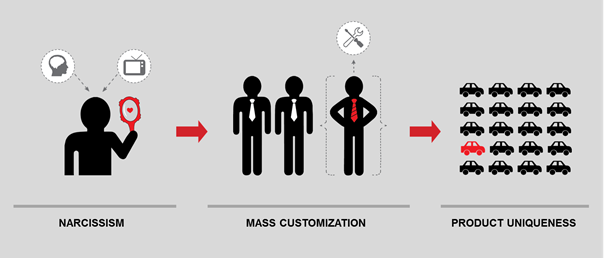How narcissism could change firms’ marketing practices

A focus on narcissism may offer new marketing avenues for firms with mass customisable products, say Swiss researchers. In short: prompting narcissistic states could encourage consumers to choose more unique - and frequently more expensive - options.
Imagine you want to buy a new car. You may go online and configure what you think is your dream model: colour black, white or grey. You don’t consider the wide range of other, more unique (and more expensive) colours, like volcano red. But if you did, it would also be to the firm’s benefit. This is where the research comes in.
Cars are a good example of mass customisation, given that they are mass produced but can be customised in a cost-efficient way, via the internet.
Emanuel de BellisExternal link and Andreas Herrmann from the University of St. Gallen’s Institute for Customer InsightExternal link, as well as international colleagues, have been looking into how certain personality traits affect how and what we purchase. In particular, they looked at how narcissism – said to be on the rise – intersects with the expanding field of mass customisation. Their findings have been published in the Journal of Retailing.External link
“The combination of these two, seemingly contradictory, terms, mass production and customisation, is rather new,” de Bellis told swissinfo.ch. In marketing, mass customisation has only been the subject of research for the last 10-15 years, he said.
Customers have the satisfaction of buying something unique and self-designed, he explained. Firms can charge more for these mass customised products than for standard ones, plus there is increased product diffusion – people will see the whole range of what the company has to offer.
Mirror, mirror
But not all customers use all the options that mass customisation has to offer (i.e. many still choose black cars). So how can firms using these systems increase the uniqueness of their products designed by their customers? This is where narcissism comes in.
Here, de Bellis, who has a background in psychology and consumer decision-making, is quick to point out that the research concerns “healthy” levels of narcissism and not the more severe narcissistic personality disorder, which affects 1-2% of the general population.
“In line with other research, we define narcissism as an unjustified conceit implying an excessive motive to self-enhance,” de Bellis said. Typical narcissists think themselves better than others, want to impress and be the centre of attention, the researcher added.
Using this broader definition of narcissism, around 20% of Western consumers are considered narcissists. Consumers in some Eastern cultures (e.g. urban China or Singapore) are, however, catching up rapidly, said de Bellis.
States and traits
The researchers carried out four studies using the car industry to show how narcissism can lead customers to seek uniquely designed products.
The first study, using actual car buyers, was able to establish that people who are more narcissistic – as revealed by an established narcissism measure – do indeed configure more unique products (e.g., choose volcano red cars).
The second set of studies looked at personality states rather than traits. Traits, said de Bellis, endure over time, but states can change rapidly from one minute to the next.
Researchers thus tried to manipulate customers into a temporary narcissistic state of mind with marketing techniques. For example, customers were shown a car advert with the slogan: “You impress” which capitalised on their desire for admiration, as well as one which said: “You belong.”
“We found that people who are in a narcissistic state in that context configure more unique products as well,” de Bellis said. And this at a rate similar to those who have regularly high levels of narcissistic traits.
The applications
“Our findings suggest that firms should consider customers’ narcissistic tendencies as well as the ability to influence their current states of mind to exploit the largely untapped potential of mass customisation systems,” the researchers conclude.
De Bellis said there were potential applications for the research in other industries, also in Switzerland. This includes jewellery, watches/smartwatches (like Swatch), and food (like Nestlé, or big retailers like Migros or Coop).

The priming technique could also be used positively by policy-makers to nudge people towards diversifying their retirement plans, de Bellis argues.
“This is less an issue in Switzerland but in the United States where people can have a say in their retirement plans and people usually don’t diversify enough. It’s important because at least in the long run diversified portfolios run better,” he said.
The future?
The research makes sense, according to Jakub SamochowiecExternal link, a senior researcher at the GDI Gottlieb Duttweiler Institute think tank who analyses social, economic, and technological changes. The article has shown that it can be applied practically, by firms and their ad men and women.
“The researchers showed by just appealing more to one’s distinguishing positive features that people are more prone to choosing for themselves. For a person who wants to sell more customised products, it just seems important to also know who the consumers are, if they are in the right place for customised products and how to speak to people, in order to enhance this more,” he commented.
“I can imagine that this is something that has already been done in an intuitive way and now it has an empirical foundation to it.”
The study coincides with what has been dubbed a narcissism epidemicExternal link, with narcissism estimated to have increased by 30% between 1979 and 2006, according to US research.
Social media and self-promoting trends, like selfies, could be one factor in the rise, the article points out. Although not everyone agrees with this (see box).
So the demand and use of mass customisation options for products we buy could also increase, making the implications of this research all the more relevant for firms, the researchers say.
Narcissism on the up? A debate.
Cross-sectional studies have shown that narcissism rose by 30% between 1979-2006. It is likely to continue, it has been argued, due to the rise of social media, selfies and other self-promoting trends.
However, as trend researcher Jakub Samochowiec points out, there is conflicting data on that issueExternal link. We think young people are more narcissistic than we are because narcissism tends to decline with age. So it is mostly an age thing and not a cultural trend.
Also, if you take fashion as a proxy for customisation, for example, people were far more individual in the 1960s and 70s than they are now. They also had more colourful cars. So there have been generations before us where this diversity, this customisation, was bigger than it is now, the researcher added.
Another point is that selfies and posting them on social media may seem narcissistic, but there is research showing that people simply enjoy experiences more when they share them, which is why we don’t like going to the cinema alone. What is often interpreted as showing everyone how cool their life is, can also be a social way of making sense out of things; an expression of the need to belong. Our young people are much more complex than we think, Samochowiec added.

In compliance with the JTI standards
More: SWI swissinfo.ch certified by the Journalism Trust Initiative


You can find an overview of ongoing debates with our journalists here. Please join us!
If you want to start a conversation about a topic raised in this article or want to report factual errors, email us at english@swissinfo.ch.